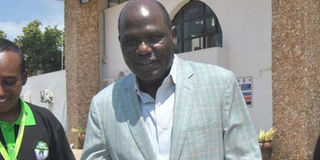Wafula Chebukati says IEBC lacks power to increase constituencies

Independent Electoral and Boundaries Commission chairman Wafula Chebukati arrives at Malindi Airport on March 7, 2018 for a tour of the region. He said the agency is preparing to review boundaries. PHOTO | CHARLES LWANGA | NATION MEDIA GROUP
What you need to know:
- Chebukati said that the earliest the review will be done is 2020, after the 2019 population census results are out.
- The IEBC has planned to finalise the roadmap for the process, as well as to review the decision-making structures for the delimitation.
The electoral commission will not increase the number of constituencies in the upcoming boundaries review, unless Parliament changes the Constitution to alter the number from the current 290, a document prepared by the agency has shown.
The Independent Electoral and Boundaries Commission will however increase or decrease the number of wards from the current 1,450 to a number that will be determined by the population size.
In a brief about the review prepared by IEBC chairman Wafula Chebukati, it has also emerged that the earliest the review will be done is 2020, after the 2019 population census results are out.
“The commission is at liberty to review the boundaries and names of constituencies. It is apparent however that the review does not mean increasing the number of constituencies, unless the Constitution is changed,” the IEBC says in a brief about the census seen by the Nation.
PARLIAMENT
The IEBC has sought Sh8 billion for the review of the boundaries.
The review must be done at intervals of not less than eight years and not more than 12 years, but should be completed at least 12 months before a General Election of Members of Parliament, coming up in 2022.
While it may not change the number of constituencies, IEBC says that the law allows it to change their sizes.
The Constitution sets the number of constituencies at 290, which the commission said cannot be added or reduced in its review of boundaries, unless that number is guided by law.
REFORMS
In its analysis of what problems the country faced during the last review completed in 2012, just before the March 2013 elections, the IEBC said that the Andrew Ligale-led team faced myriad challenges.
Already, the Raila Odinga-led opposition National Super Alliance has called for a “thorough reform” of the IEBC, and said that it should not preside over the all-important boundaries review.
“As currently constituted, and given the amendments that Jubilee introduced to the election laws agreed on in the run-up to the 2017 polls, and having presided over elections marred by illegalities and irregularities, the IEBC cannot preside over the review of boundaries expected in 2018,” Nasa said in a statement on Tuesday.
PREPARATIONS
But Mr Chebukati, speaking in Malindi on Wednesday, said that, while he had not received a formal complaint from Nasa, the review “is a job which must be done”.
Even if the Constitution was to be changed, the agency does not have powers over the county boundaries.
In the next two years before the start of the review, the IEBC has planned to finalise the roadmap for the process, as well as to review the legal framework, processes, and the decision-making structures for the delimitation.





